Reflecting on Health Assessment: A Nursing Perspective
VerifiedAdded on 2023/01/19
|6
|1715
|71
Report
AI Summary
This reflection paper delves into a nursing student's personal experience and learning journey throughout a semester focused on health assessment. The paper utilizes Gibb's Reflective Cycle to analyze the student's experiences with health interviewing, specifically focusing on an interaction with an elderly Aboriginal patient. The student reflects on the nervousness felt before the interview, the importance of building trust, and the challenges of gathering comprehensive patient information while considering cultural sensitivities. The reflection also highlights the significance of critical thinking, the role of the mentor, and the impact of the experience on the student's confidence and understanding of the NMBA standards. The student evaluates the semester's learning, analyzes the challenges encountered, and concludes with an action plan that includes further research, addressing feedback, and seeking guidance from seniors to improve clinical practice and meet the requirements of NMBA standards.
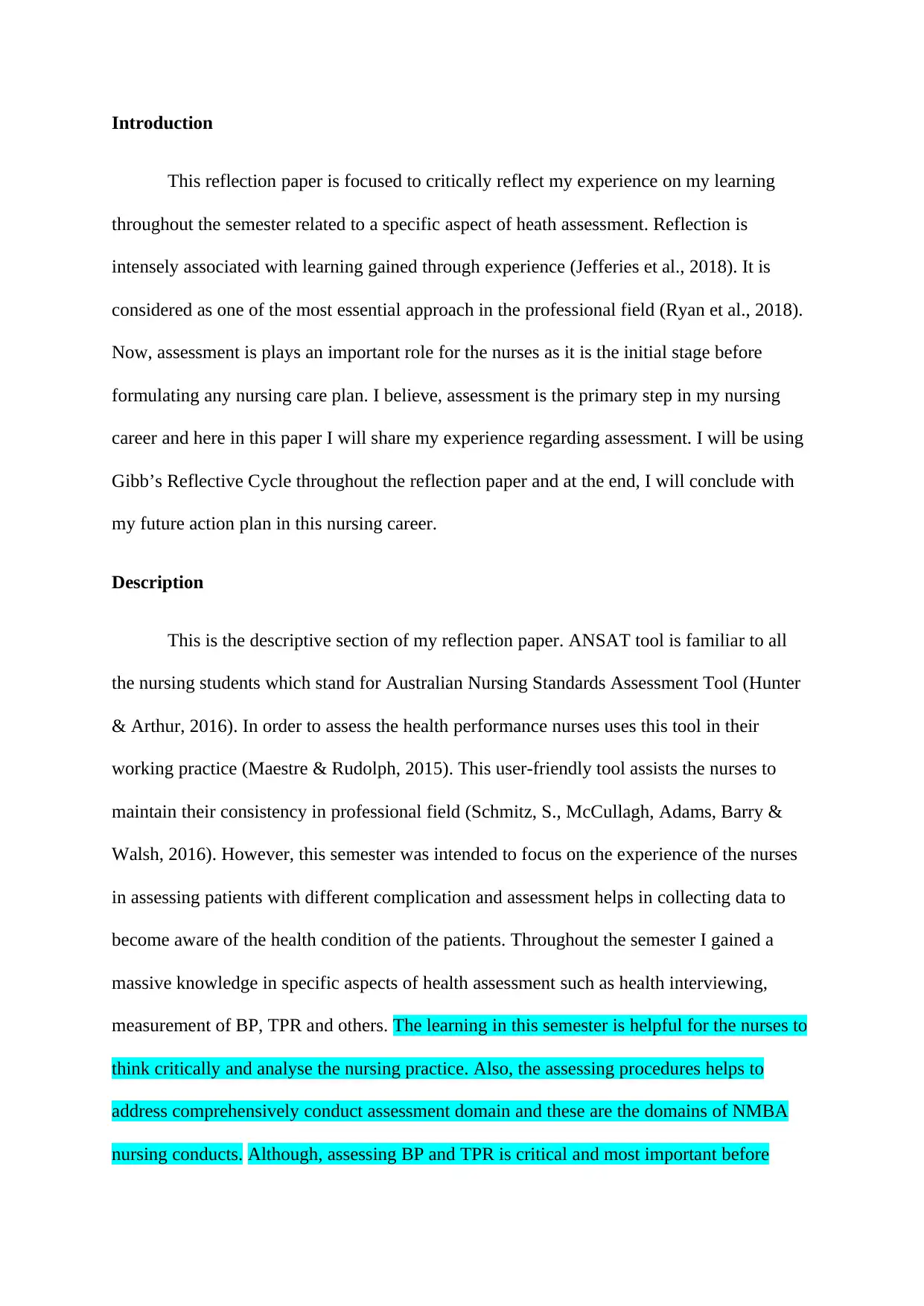
Introduction
This reflection paper is focused to critically reflect my experience on my learning
throughout the semester related to a specific aspect of heath assessment. Reflection is
intensely associated with learning gained through experience (Jefferies et al., 2018). It is
considered as one of the most essential approach in the professional field (Ryan et al., 2018).
Now, assessment is plays an important role for the nurses as it is the initial stage before
formulating any nursing care plan. I believe, assessment is the primary step in my nursing
career and here in this paper I will share my experience regarding assessment. I will be using
Gibb’s Reflective Cycle throughout the reflection paper and at the end, I will conclude with
my future action plan in this nursing career.
Description
This is the descriptive section of my reflection paper. ANSAT tool is familiar to all
the nursing students which stand for Australian Nursing Standards Assessment Tool (Hunter
& Arthur, 2016). In order to assess the health performance nurses uses this tool in their
working practice (Maestre & Rudolph, 2015). This user-friendly tool assists the nurses to
maintain their consistency in professional field (Schmitz, S., McCullagh, Adams, Barry &
Walsh, 2016). However, this semester was intended to focus on the experience of the nurses
in assessing patients with different complication and assessment helps in collecting data to
become aware of the health condition of the patients. Throughout the semester I gained a
massive knowledge in specific aspects of health assessment such as health interviewing,
measurement of BP, TPR and others. The learning in this semester is helpful for the nurses to
think critically and analyse the nursing practice. Also, the assessing procedures helps to
address comprehensively conduct assessment domain and these are the domains of NMBA
nursing conducts. Although, assessing BP and TPR is critical and most important before
This reflection paper is focused to critically reflect my experience on my learning
throughout the semester related to a specific aspect of heath assessment. Reflection is
intensely associated with learning gained through experience (Jefferies et al., 2018). It is
considered as one of the most essential approach in the professional field (Ryan et al., 2018).
Now, assessment is plays an important role for the nurses as it is the initial stage before
formulating any nursing care plan. I believe, assessment is the primary step in my nursing
career and here in this paper I will share my experience regarding assessment. I will be using
Gibb’s Reflective Cycle throughout the reflection paper and at the end, I will conclude with
my future action plan in this nursing career.
Description
This is the descriptive section of my reflection paper. ANSAT tool is familiar to all
the nursing students which stand for Australian Nursing Standards Assessment Tool (Hunter
& Arthur, 2016). In order to assess the health performance nurses uses this tool in their
working practice (Maestre & Rudolph, 2015). This user-friendly tool assists the nurses to
maintain their consistency in professional field (Schmitz, S., McCullagh, Adams, Barry &
Walsh, 2016). However, this semester was intended to focus on the experience of the nurses
in assessing patients with different complication and assessment helps in collecting data to
become aware of the health condition of the patients. Throughout the semester I gained a
massive knowledge in specific aspects of health assessment such as health interviewing,
measurement of BP, TPR and others. The learning in this semester is helpful for the nurses to
think critically and analyse the nursing practice. Also, the assessing procedures helps to
address comprehensively conduct assessment domain and these are the domains of NMBA
nursing conducts. Although, assessing BP and TPR is critical and most important before
Paraphrase This Document
Need a fresh take? Get an instant paraphrase of this document with our AI Paraphraser
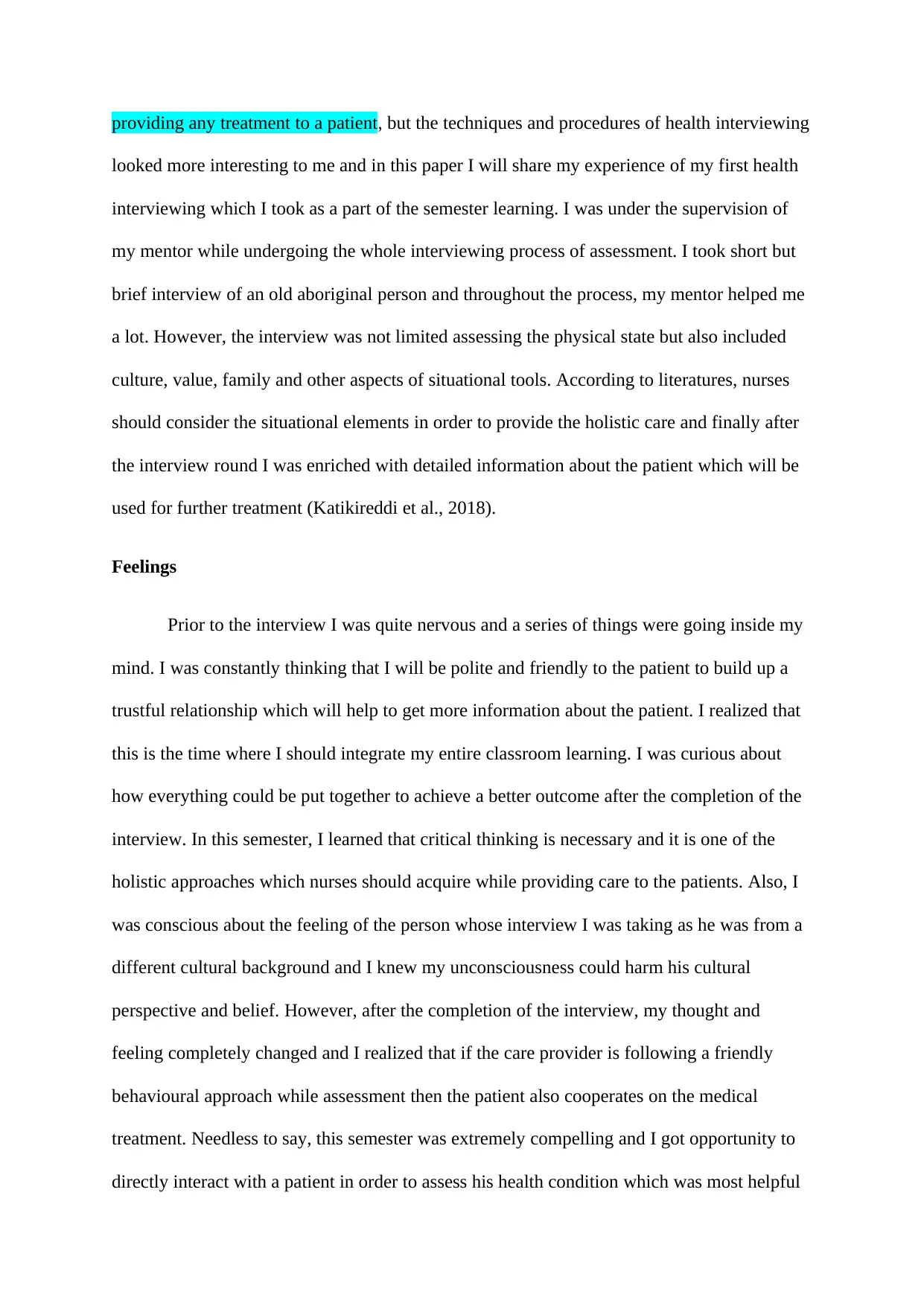
providing any treatment to a patient, but the techniques and procedures of health interviewing
looked more interesting to me and in this paper I will share my experience of my first health
interviewing which I took as a part of the semester learning. I was under the supervision of
my mentor while undergoing the whole interviewing process of assessment. I took short but
brief interview of an old aboriginal person and throughout the process, my mentor helped me
a lot. However, the interview was not limited assessing the physical state but also included
culture, value, family and other aspects of situational tools. According to literatures, nurses
should consider the situational elements in order to provide the holistic care and finally after
the interview round I was enriched with detailed information about the patient which will be
used for further treatment (Katikireddi et al., 2018).
Feelings
Prior to the interview I was quite nervous and a series of things were going inside my
mind. I was constantly thinking that I will be polite and friendly to the patient to build up a
trustful relationship which will help to get more information about the patient. I realized that
this is the time where I should integrate my entire classroom learning. I was curious about
how everything could be put together to achieve a better outcome after the completion of the
interview. In this semester, I learned that critical thinking is necessary and it is one of the
holistic approaches which nurses should acquire while providing care to the patients. Also, I
was conscious about the feeling of the person whose interview I was taking as he was from a
different cultural background and I knew my unconsciousness could harm his cultural
perspective and belief. However, after the completion of the interview, my thought and
feeling completely changed and I realized that if the care provider is following a friendly
behavioural approach while assessment then the patient also cooperates on the medical
treatment. Needless to say, this semester was extremely compelling and I got opportunity to
directly interact with a patient in order to assess his health condition which was most helpful
looked more interesting to me and in this paper I will share my experience of my first health
interviewing which I took as a part of the semester learning. I was under the supervision of
my mentor while undergoing the whole interviewing process of assessment. I took short but
brief interview of an old aboriginal person and throughout the process, my mentor helped me
a lot. However, the interview was not limited assessing the physical state but also included
culture, value, family and other aspects of situational tools. According to literatures, nurses
should consider the situational elements in order to provide the holistic care and finally after
the interview round I was enriched with detailed information about the patient which will be
used for further treatment (Katikireddi et al., 2018).
Feelings
Prior to the interview I was quite nervous and a series of things were going inside my
mind. I was constantly thinking that I will be polite and friendly to the patient to build up a
trustful relationship which will help to get more information about the patient. I realized that
this is the time where I should integrate my entire classroom learning. I was curious about
how everything could be put together to achieve a better outcome after the completion of the
interview. In this semester, I learned that critical thinking is necessary and it is one of the
holistic approaches which nurses should acquire while providing care to the patients. Also, I
was conscious about the feeling of the person whose interview I was taking as he was from a
different cultural background and I knew my unconsciousness could harm his cultural
perspective and belief. However, after the completion of the interview, my thought and
feeling completely changed and I realized that if the care provider is following a friendly
behavioural approach while assessment then the patient also cooperates on the medical
treatment. Needless to say, this semester was extremely compelling and I got opportunity to
directly interact with a patient in order to assess his health condition which was most helpful
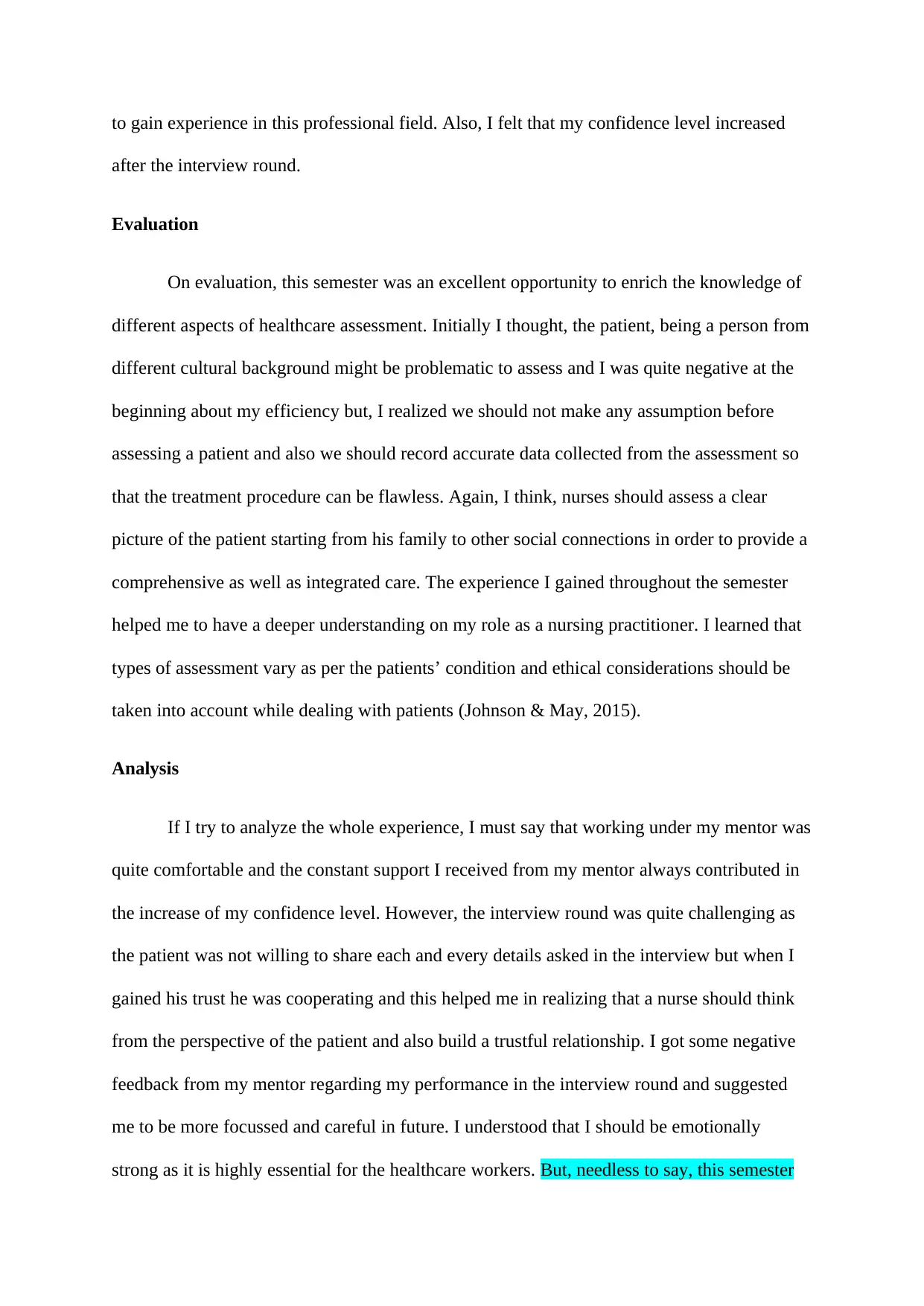
to gain experience in this professional field. Also, I felt that my confidence level increased
after the interview round.
Evaluation
On evaluation, this semester was an excellent opportunity to enrich the knowledge of
different aspects of healthcare assessment. Initially I thought, the patient, being a person from
different cultural background might be problematic to assess and I was quite negative at the
beginning about my efficiency but, I realized we should not make any assumption before
assessing a patient and also we should record accurate data collected from the assessment so
that the treatment procedure can be flawless. Again, I think, nurses should assess a clear
picture of the patient starting from his family to other social connections in order to provide a
comprehensive as well as integrated care. The experience I gained throughout the semester
helped me to have a deeper understanding on my role as a nursing practitioner. I learned that
types of assessment vary as per the patients’ condition and ethical considerations should be
taken into account while dealing with patients (Johnson & May, 2015).
Analysis
If I try to analyze the whole experience, I must say that working under my mentor was
quite comfortable and the constant support I received from my mentor always contributed in
the increase of my confidence level. However, the interview round was quite challenging as
the patient was not willing to share each and every details asked in the interview but when I
gained his trust he was cooperating and this helped me in realizing that a nurse should think
from the perspective of the patient and also build a trustful relationship. I got some negative
feedback from my mentor regarding my performance in the interview round and suggested
me to be more focussed and careful in future. I understood that I should be emotionally
strong as it is highly essential for the healthcare workers. But, needless to say, this semester
after the interview round.
Evaluation
On evaluation, this semester was an excellent opportunity to enrich the knowledge of
different aspects of healthcare assessment. Initially I thought, the patient, being a person from
different cultural background might be problematic to assess and I was quite negative at the
beginning about my efficiency but, I realized we should not make any assumption before
assessing a patient and also we should record accurate data collected from the assessment so
that the treatment procedure can be flawless. Again, I think, nurses should assess a clear
picture of the patient starting from his family to other social connections in order to provide a
comprehensive as well as integrated care. The experience I gained throughout the semester
helped me to have a deeper understanding on my role as a nursing practitioner. I learned that
types of assessment vary as per the patients’ condition and ethical considerations should be
taken into account while dealing with patients (Johnson & May, 2015).
Analysis
If I try to analyze the whole experience, I must say that working under my mentor was
quite comfortable and the constant support I received from my mentor always contributed in
the increase of my confidence level. However, the interview round was quite challenging as
the patient was not willing to share each and every details asked in the interview but when I
gained his trust he was cooperating and this helped me in realizing that a nurse should think
from the perspective of the patient and also build a trustful relationship. I got some negative
feedback from my mentor regarding my performance in the interview round and suggested
me to be more focussed and careful in future. I understood that I should be emotionally
strong as it is highly essential for the healthcare workers. But, needless to say, this semester
⊘ This is a preview!⊘
Do you want full access?
Subscribe today to unlock all pages.

Trusted by 1+ million students worldwide
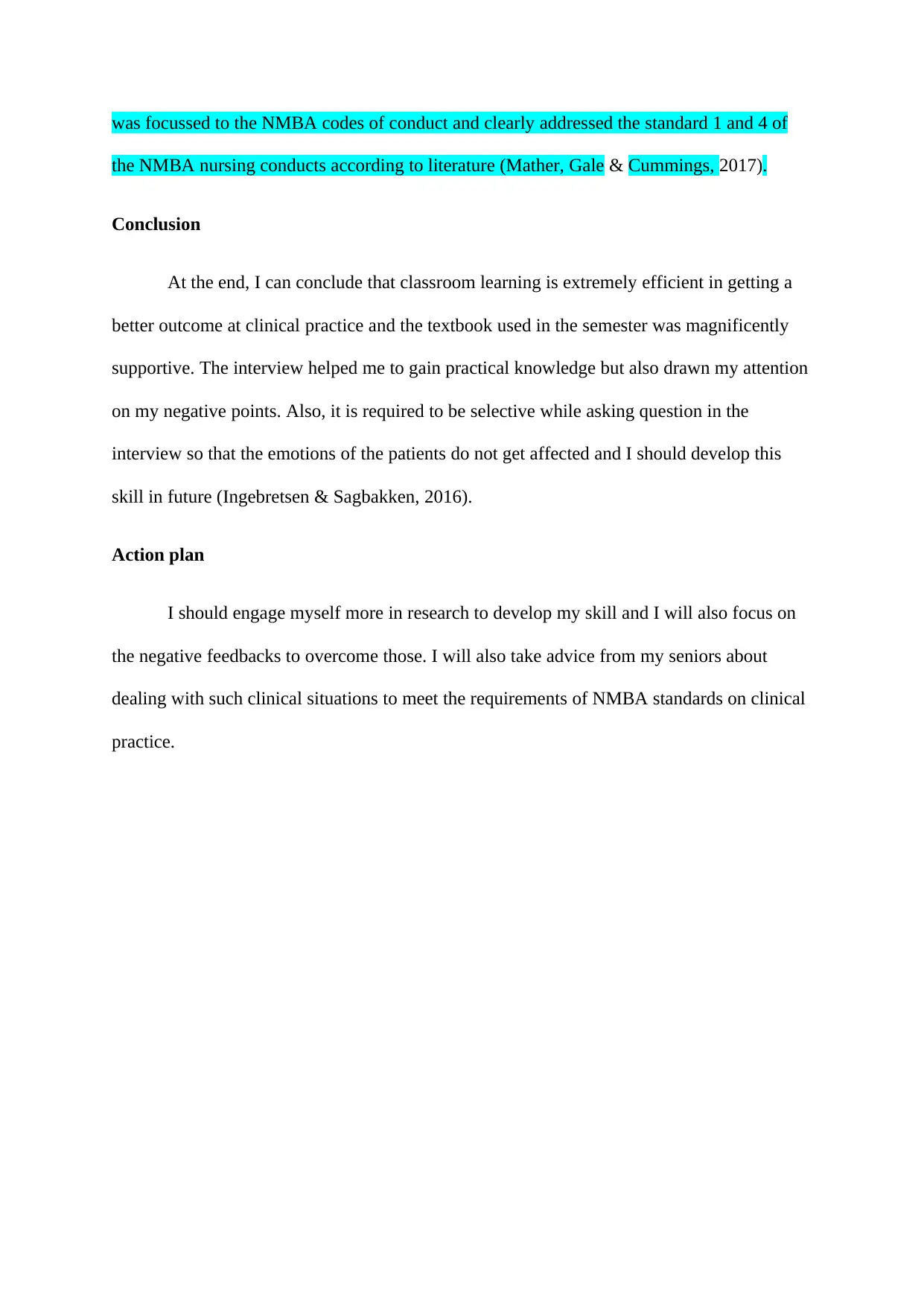
was focussed to the NMBA codes of conduct and clearly addressed the standard 1 and 4 of
the NMBA nursing conducts according to literature (Mather, Gale & Cummings, 2017).
Conclusion
At the end, I can conclude that classroom learning is extremely efficient in getting a
better outcome at clinical practice and the textbook used in the semester was magnificently
supportive. The interview helped me to gain practical knowledge but also drawn my attention
on my negative points. Also, it is required to be selective while asking question in the
interview so that the emotions of the patients do not get affected and I should develop this
skill in future (Ingebretsen & Sagbakken, 2016).
Action plan
I should engage myself more in research to develop my skill and I will also focus on
the negative feedbacks to overcome those. I will also take advice from my seniors about
dealing with such clinical situations to meet the requirements of NMBA standards on clinical
practice.
the NMBA nursing conducts according to literature (Mather, Gale & Cummings, 2017).
Conclusion
At the end, I can conclude that classroom learning is extremely efficient in getting a
better outcome at clinical practice and the textbook used in the semester was magnificently
supportive. The interview helped me to gain practical knowledge but also drawn my attention
on my negative points. Also, it is required to be selective while asking question in the
interview so that the emotions of the patients do not get affected and I should develop this
skill in future (Ingebretsen & Sagbakken, 2016).
Action plan
I should engage myself more in research to develop my skill and I will also focus on
the negative feedbacks to overcome those. I will also take advice from my seniors about
dealing with such clinical situations to meet the requirements of NMBA standards on clinical
practice.
Paraphrase This Document
Need a fresh take? Get an instant paraphrase of this document with our AI Paraphraser
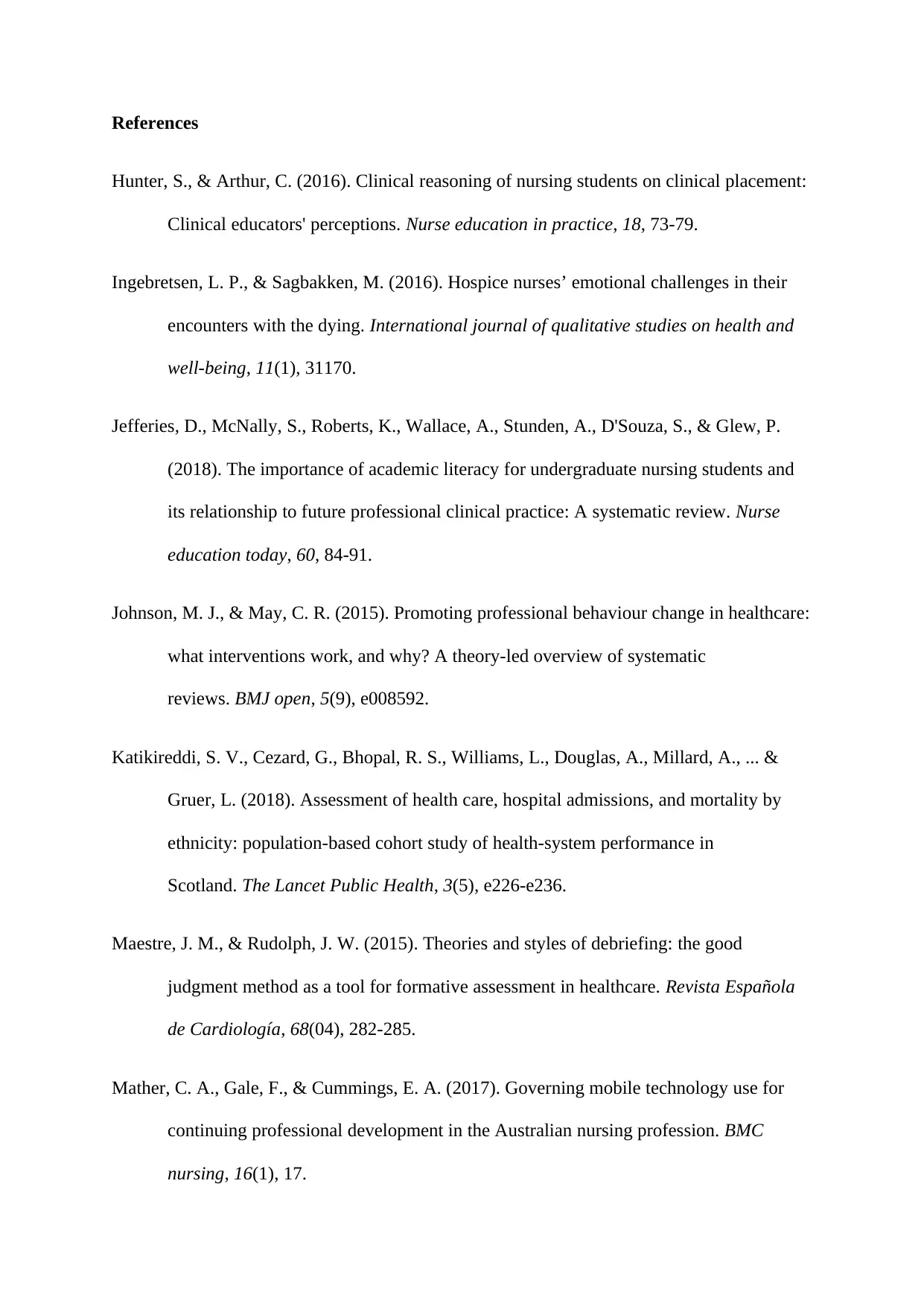
References
Hunter, S., & Arthur, C. (2016). Clinical reasoning of nursing students on clinical placement:
Clinical educators' perceptions. Nurse education in practice, 18, 73-79.
Ingebretsen, L. P., & Sagbakken, M. (2016). Hospice nurses’ emotional challenges in their
encounters with the dying. International journal of qualitative studies on health and
well-being, 11(1), 31170.
Jefferies, D., McNally, S., Roberts, K., Wallace, A., Stunden, A., D'Souza, S., & Glew, P.
(2018). The importance of academic literacy for undergraduate nursing students and
its relationship to future professional clinical practice: A systematic review. Nurse
education today, 60, 84-91.
Johnson, M. J., & May, C. R. (2015). Promoting professional behaviour change in healthcare:
what interventions work, and why? A theory-led overview of systematic
reviews. BMJ open, 5(9), e008592.
Katikireddi, S. V., Cezard, G., Bhopal, R. S., Williams, L., Douglas, A., Millard, A., ... &
Gruer, L. (2018). Assessment of health care, hospital admissions, and mortality by
ethnicity: population-based cohort study of health-system performance in
Scotland. The Lancet Public Health, 3(5), e226-e236.
Maestre, J. M., & Rudolph, J. W. (2015). Theories and styles of debriefing: the good
judgment method as a tool for formative assessment in healthcare. Revista Española
de Cardiología, 68(04), 282-285.
Mather, C. A., Gale, F., & Cummings, E. A. (2017). Governing mobile technology use for
continuing professional development in the Australian nursing profession. BMC
nursing, 16(1), 17.
Hunter, S., & Arthur, C. (2016). Clinical reasoning of nursing students on clinical placement:
Clinical educators' perceptions. Nurse education in practice, 18, 73-79.
Ingebretsen, L. P., & Sagbakken, M. (2016). Hospice nurses’ emotional challenges in their
encounters with the dying. International journal of qualitative studies on health and
well-being, 11(1), 31170.
Jefferies, D., McNally, S., Roberts, K., Wallace, A., Stunden, A., D'Souza, S., & Glew, P.
(2018). The importance of academic literacy for undergraduate nursing students and
its relationship to future professional clinical practice: A systematic review. Nurse
education today, 60, 84-91.
Johnson, M. J., & May, C. R. (2015). Promoting professional behaviour change in healthcare:
what interventions work, and why? A theory-led overview of systematic
reviews. BMJ open, 5(9), e008592.
Katikireddi, S. V., Cezard, G., Bhopal, R. S., Williams, L., Douglas, A., Millard, A., ... &
Gruer, L. (2018). Assessment of health care, hospital admissions, and mortality by
ethnicity: population-based cohort study of health-system performance in
Scotland. The Lancet Public Health, 3(5), e226-e236.
Maestre, J. M., & Rudolph, J. W. (2015). Theories and styles of debriefing: the good
judgment method as a tool for formative assessment in healthcare. Revista Española
de Cardiología, 68(04), 282-285.
Mather, C. A., Gale, F., & Cummings, E. A. (2017). Governing mobile technology use for
continuing professional development in the Australian nursing profession. BMC
nursing, 16(1), 17.
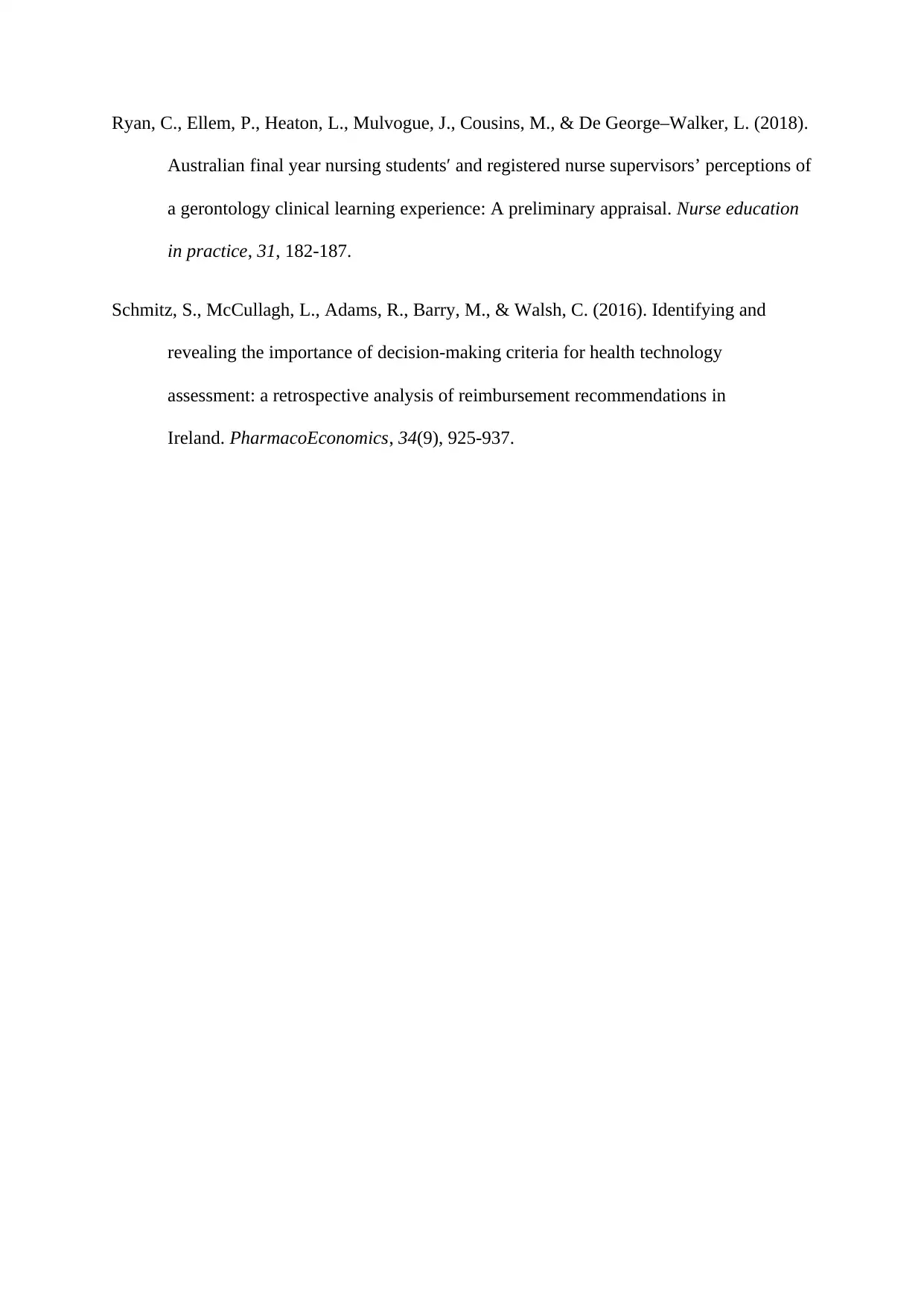
Ryan, C., Ellem, P., Heaton, L., Mulvogue, J., Cousins, M., & De George–Walker, L. (2018).
Australian final year nursing students′ and registered nurse supervisors’ perceptions of
a gerontology clinical learning experience: A preliminary appraisal. Nurse education
in practice, 31, 182-187.
Schmitz, S., McCullagh, L., Adams, R., Barry, M., & Walsh, C. (2016). Identifying and
revealing the importance of decision-making criteria for health technology
assessment: a retrospective analysis of reimbursement recommendations in
Ireland. PharmacoEconomics, 34(9), 925-937.
Australian final year nursing students′ and registered nurse supervisors’ perceptions of
a gerontology clinical learning experience: A preliminary appraisal. Nurse education
in practice, 31, 182-187.
Schmitz, S., McCullagh, L., Adams, R., Barry, M., & Walsh, C. (2016). Identifying and
revealing the importance of decision-making criteria for health technology
assessment: a retrospective analysis of reimbursement recommendations in
Ireland. PharmacoEconomics, 34(9), 925-937.
⊘ This is a preview!⊘
Do you want full access?
Subscribe today to unlock all pages.

Trusted by 1+ million students worldwide
1 out of 6
Related Documents
Your All-in-One AI-Powered Toolkit for Academic Success.
+13062052269
info@desklib.com
Available 24*7 on WhatsApp / Email
![[object Object]](/_next/static/media/star-bottom.7253800d.svg)
Unlock your academic potential
Copyright © 2020–2026 A2Z Services. All Rights Reserved. Developed and managed by ZUCOL.





